Mohammed bin Salman Al Saud Height Weight Age Wiki Net Worth, Affairs, Marriage, Wife, Children, Family Biography & much more. Mohammed bin Salman Al Saud (Arabic: محمد بن سلمان آل سعود, romanized : Muḥammad bin Salmān Āl Su‘ūd; born 31 August 1985), colloquially known as MBS, is a Saudi Arabian politician who is the crown prince, deputy prime minister, and minister of defense of Saudi Arabia. He also serves as the chairman of the Council of Economic and Development Affairs and chairman of the Council of Political and Security Affairs. He is the seventh son of King Salman bin Abdulaziz and the eldest of six sons born to King Salman’s third wife, Fahda bint Falah Al Hithlain. Mohammed bin Salman controls his father’s government and is considered the de facto ruler of Saudi Arabia. In June 2017, King Salman removed his nephew Muhammad bin Nayef from the position of crown prince and appointed Mohammed bin Salman in his place.
Bin Salman rules an authoritarian regime. There are no democratic institutions in Saudi Arabia, and elements of repression are still evident. Human rights activists, women’s rights activists, journalists, former insiders, and dissidents are systematically repressed through tactics including torture, jailing, and killings, and bin Salman is said to use a group of assassins known as the Tiger Squad to carry out extrajudicial killings. He was personally linked to the assassination of Jamal Khashoggi, a Saudi Arabian Washington Post columnist who had criticised the Saudi government, but he has denied involvement in the killing. Bin Salman was behind the Saudi bombing campaign in Yemen which has exacerbated the humanitarian crisis and famine there. His government has overseen a crackdown on feminists. Bin Salman was also involved in the escalation of the Qatar diplomatic crisis, the detention of Lebanese Prime Minister Saad Hariri, the start of a diplomatic spat with Canada, the arrest of Saudi princes and billionaires in November 2017, the alleged phone hack against Amazon chairman Jeff Bezos, and treason charges against his cousin and rival Muhammad bin Nayef in March 2020.
Bin Salman has touted reforms in an effort to rebrand his regime’s image internationally and within the Kingdom. These include regulations restricting the powers of the religious police and improving women’s rights, such as the removal of the ban on female drivers in June 2018 and weakening the male-guardianship system in August 2019. Other cultural developments under his reign include the first Saudi public concerts by a female singer, the first Saudi sports stadium to admit women, an increased presence of women in the workforce, and opening the country to international tourists by introducing an e-visa system, allowing foreign visas to be applied for and issued via the Internet. The Saudi Vision 2030 program aims to diversify the country’s economy through investment in non-oil sectors including technology and tourism.
Early life
Mohammed bin Salman Al Saud was born on 31 August 1985 to Prince Salman bin Abdulaziz and his third spouse, Fahda bint Falah Al Hithlain.Fahda is a granddaughter of Rakan bin Hithlain, who was the head of the Al Ajman tribe. In 1915 the Al Ajman tribe, under Dhaydan’s leadership, fought against the Al Saud during which King Abdulaziz’s brother Saad bin Abdul Rahman was killed in the battle of Kanzan.
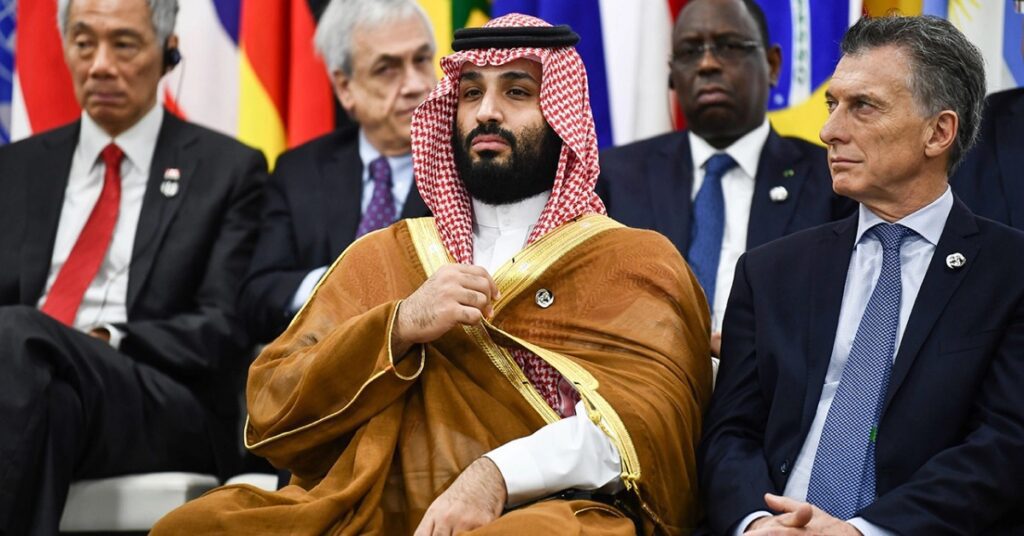
Bin Salman is the eldest among his mother’s six children and is the eighth child and seventh son of his father. His full siblings include Turki bin Salman and Khalid bin Salman. Prince Mohammed holds a bachelor’s degree in law from King Saud University.
Early career
After graduating from university, bin Salman spent several years in the private sector before becoming a personal aide to his father. He worked as a consultant for the Experts Commission, working for the Saudi Cabinet. On 15 December 2009, at the age of 24, he entered politics as a special advisor to his father when the latter was the governor of Riyadh Province. At this time bin Salman began to rise from one position to another, such as secretary-general of the Riyadh Competitive Council, special advisor to the chairman of the board for the King Abdulaziz Foundation for Research and Archives, and a member of the board of trustees for Albir Society in the Riyadh region. In October 2011, Crown Prince Sultan bin Abdulaziz died. Prince Salman began his ascent to power by becoming Second Deputy Prime Minister and Minister of Defence. He made his son Mohammed his private advisor.
Chief of the Court
In June 2012, Crown Prince Nayef bin Abdulaziz died. Mohammed bin Salman moved up into the number two position in the hierarchy, as his father became the new crown prince and first deputy prime minister. He soon began remaking the court in his own image. On 2 March 2013, the chief of the Crown Prince court, Prince Saud bin Nayef, was appointed governor of the Eastern Province and bin Salman succeeded him in the post. He was also given the rank of minister. On 25 April 2014, bin Salman was appointed state minister.
Mohammed bin Salman Al Saud Height Weight Age Wife Power Politics Affair Biography
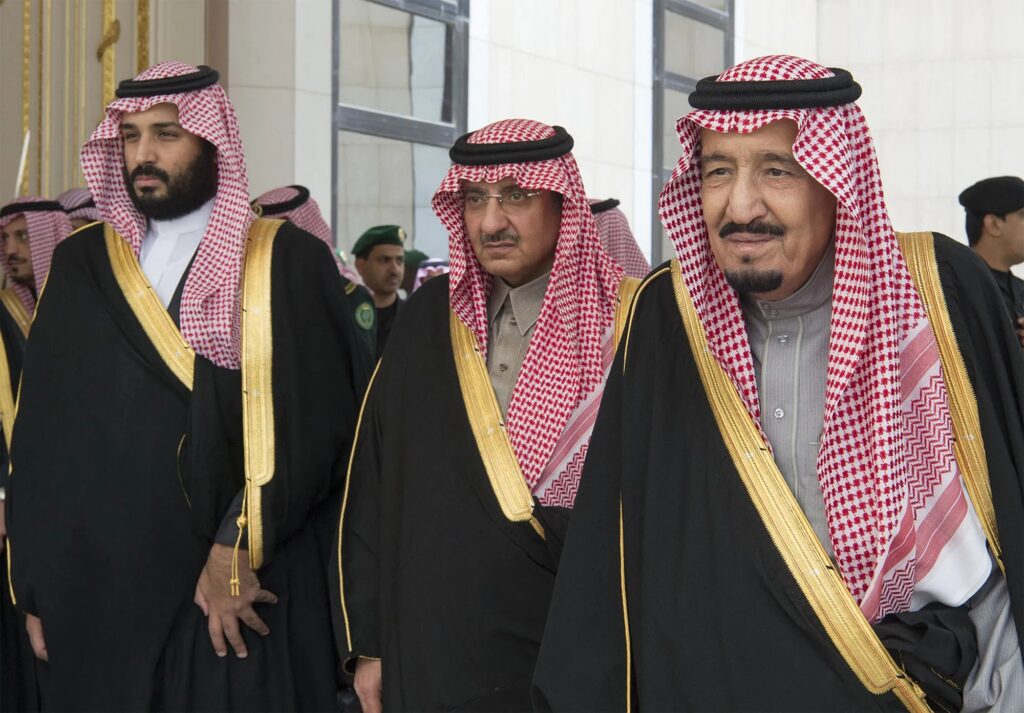
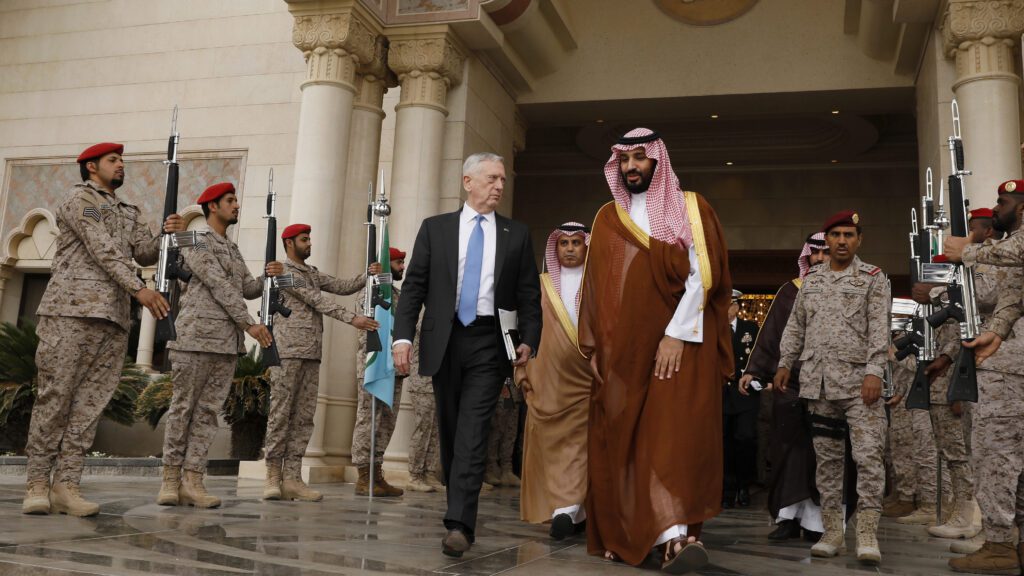
Personal life
On 6 April 2008 bin Salman married his first cousin Sara bint Mashour, a daughter of his paternal uncle Mashour bin Abdulaziz. Prince Mohammed and Princess Sara have five children; the first four were named after their grandparents, and the fifth one is named after his great-grandfather King Abdulaziz, the founder of Saudi Arabia. In 2022, The Economist reported that on at least one occasion, bin Salman beat his wife so severely that medical treatment was required.
In 2018 bin Salman’s personal net worth was estimated at US$3.0 billion.
In 2015, bin Salman purchased the Italian-built and Bermuda-registered yacht Serene from Russian vodka tycoon Yuri Shefler for €500 million.In 2015, he purchased the Château Louis XIV in France for over $300 million.
In December 2017, a number of sources reported that bin Salman, using his close associate Prince Badr bin Abdullah bin Mohammed Al Farhan as an intermediary, had bought the Salvator Mundi by Leonardo da Vinci; the sale in November at $450.3 million set a new record price for a work of art. This report has been denied by the auctioneer Christie’s, the Embassy of Saudi Arabia, and the Government of the United Arab Emirates, which has announced that it is the actual owner of the painting. The exact current location of the painting is unknown, as it has not been seen publicly since the auction. However it has been suggested that Bin Salman’s Serene motor yacht possibly houses the painting Salvator Mundi.
Bin Salman has travelled extensively around the world, meeting with politicians, business leaders and celebrities. In June 2016, he travelled to Silicon Valley and met key people in the US high tech industry, including Facebook founder Mark Zuckerberg. In early 2018, he visited the United States, where he met with many politicians, business people and Hollywood stars, including then-President Trump, Bill and Hillary Clinton, Henry Kissinger, Michael Bloomberg, George W. Bush, George H. W. Bush, Bill Gates, Jeff Bezos, Oprah Winfrey, Rupert Murdoch, Richard Branson, Mayor Eric Garcetti of Los Angeles, Michael Douglas, Morgan Freeman, and Dwayne Johnson. Trump praised his relationship with bin Salman. The prince also visited the United Kingdom, where he met with Prime Minister Theresa May, Queen Elizabeth II and Prince William, Duke of Cambridge.
On 25 December 2020, as part of the Saudi Arabian Ministry of Health’s national COVID-19 vaccination plan, the Crown Prince was shown receiving the vaccine in a video released by the Saudi Press Agency.
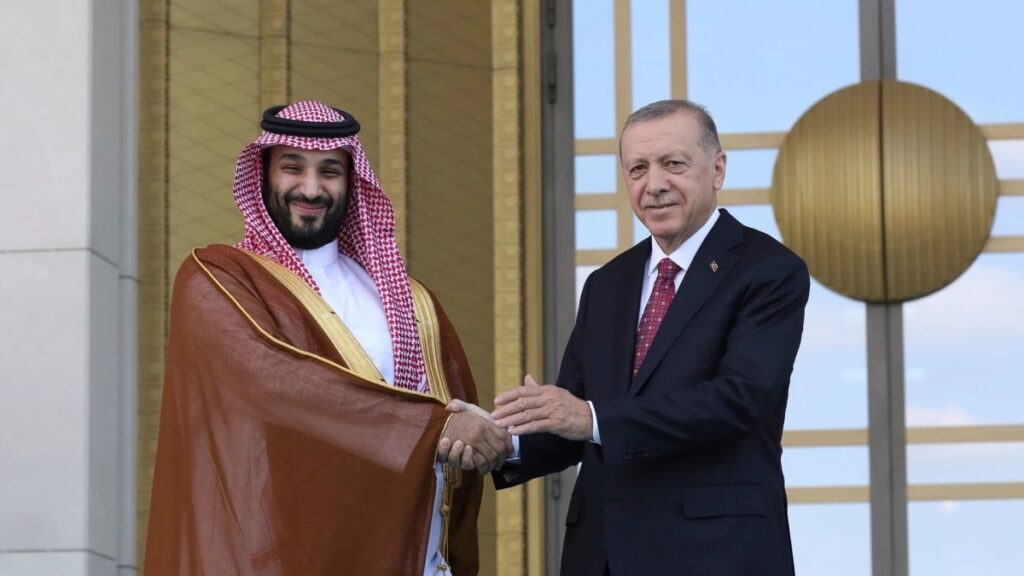
In December 2020, bin Salman invested money into Take-Two Interactive, Electronic Arts, and Activision Blizzard through Saudi Arabia’s sovereign wealth fund. The investments amounted to 14.9 million shares in Activision Blizzard, 7.4 million shares in Electronic Arts, and 3.9 million shares in Take-Two Interactive. Bin Salman has stated that he grew up playing video games.
Minister of Defense
On 23 January 2015, King Abdullah died and Salman ascended the throne. Bin Salman was appointed minister of defense and secretary general of the Royal Court. In addition, he retained his post as the minister of state.
In Yemen, the political unrest (which began escalating in 2011) rapidly became a major issue for the newly appointed minister of defence, with Houthis taking control of northern Yemen in late 2014, followed by President Abdrabbuh Mansur Hadi and his cabinet’s resignation. Bin Salman’s first move as minister was to mobilise a pan-GCC coalition to intervene following a series of suicide bombings in Sana’a via air strikes against Houthis, and impose a naval blockade. In March 2015, Saudi Arabia began leading a coalition of countries allied against the Houthi rebels. While there was agreement among those Saudi princes heading security services regarding the necessity of a response to the Houthis’ seizure of Sana’a, which had forced the Yemeni government into exile, bin Salman launched the intervention without full coordination across security services. Saudi National Guard minister Prince Mutaib bin Abdullah, who was out of the country, was left out of the loop of operations. While bin Salman sold the war as a quick win on Houthi rebels in Yemen and a way to put President Hadi back in power, however, it became a long war of attrition.
In April 2015, King Salman appointed his nephew Muhammad bin Nayef as Crown Prince and his son Mohammed bin Salman as Deputy Crown Prince. In late 2015, at a meeting between his father and U.S. President Barack Obama, bin Salman broke protocol to deliver a monologue criticising U.S. foreign policy. When he announced an anti-terrorist military alliance of Islamic countries in December 2015, some of the countries involved said they had not been consulted.
President Barack Obama, CIA Director John O. Brennan, King Salman bin Abdulaziz and Prince Mohammed bin Salman at the GCC-US Summit in Riyadh on 21 April 2016
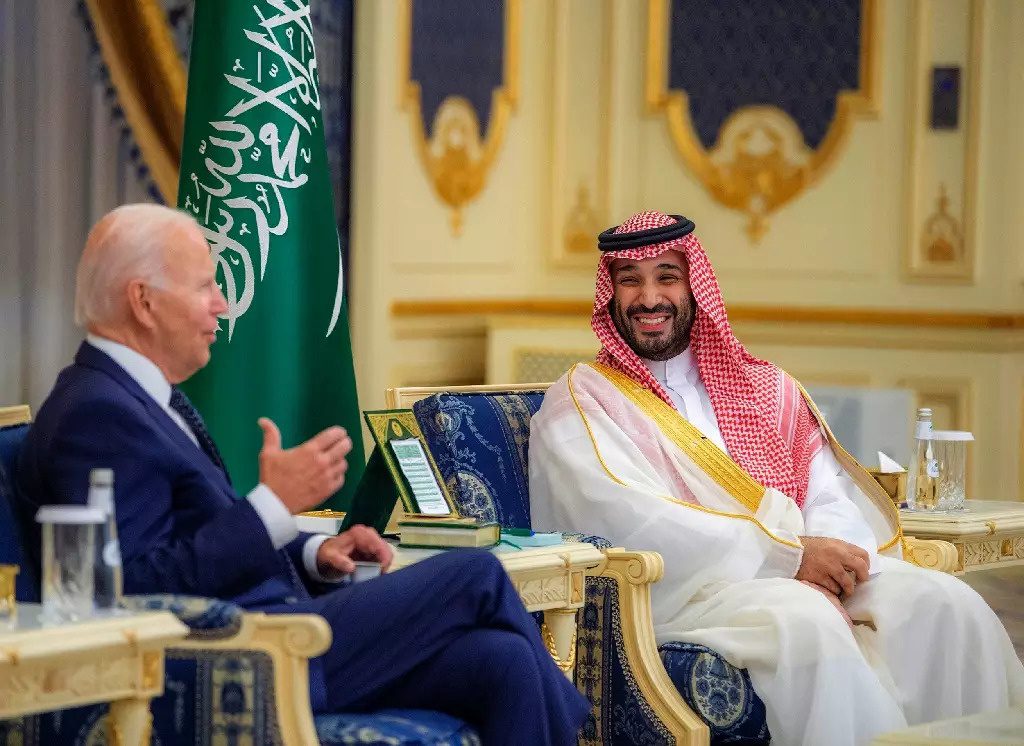
President Donald Trump speaks with bin Salman, Washington, D.C., 14 March 2017
Regarding his role in the military intervention, bin Salman gave his first on-the-record interview on 4 January 2016 to The Economist, which had called him the “architect of the war in Yemen”. Denying the title, he explained the mechanism of the decision-making institutions actually holding stakes in the intervention, including the council of security and political affairs, Ministry of Foreign Affairs from the Saudi side. He added that the Houthis usurped power in the Yemeni capital Sana’a before he served as minister of defence.
In response to the threat from ISIL, bin Salman established the Islamic Military Counter Terrorism Coalition (IMCTC), a Saudi-led Islamic alliance against terrorism, in December 2015. The IMCTC’s first meeting took place in Riyadh in November 2017 and involved defence ministers and officials from 41 countries.
Administration
Bin Salman’s ideology has been described as nationalist and populist, with a conservative attitude towards politics, and a liberal stance on economic and social issues.It has been heavily influenced by the views of his former adviser Saud al-Qahtani and Abu Dhabi Crown Prince Mohammed bin Zayed.His style of ruling has been described as extremely brutal by journalist Rula Jebreal and authoritarian by Jamal Khashoggi and Theodor Winkler.
Bin Salman with the Prime Minister of India, Narendra Modi, at the 2016 G20 Hangzhou summit
On 29 January 2015, bin Salman was named the chair of the newly established Council for Economic and Development Affairs, replacing the disbanded Supreme Economic Commission. In April 2015, bin Salman was given control over Saudi Aramco by royal decree following his appointment as deputy crown prince.
In December 2017, bin Salman criticised United States’ decision to recognise Jerusalem as the capital of Israel. In March 2018, he referred to Turkey as part of a “triangle of evil” alongside Iran and Muslim Brotherhood. In 2018, he voiced his support for a Jewish homeland of Israel. This is the first time that a senior Saudi royal has expressed such sentiments publicly. In September 2019, bin Salman condemned Israeli Prime Minister Benjamin Netanyahu’s plans to annex the eastern portion of the occupied West Bank known as the Jordan Valley.
Under bin Salman’s leadership, Saudi Arabia strengthened its relationship with Russian leader Vladimir Putin. In 2016, bin Salman signed an agreement to cooperate with Russia in global oil markets. After bin Salman was accused of murdering Jamal Khashoggi, Putin was one of few world leaders to publicly embrace bin Salman.In 2021, bin Salman signed a military cooperation agreement with Russia.
Vision 2030
Bin Salman with President Trump’s son-in-law Jared Kushner and daughter Ivanka Trump, U.S. Commerce Secretary Wilbur Ross, U.S. Secretary of State Rex Tillerson, and White House Chief of Staff Reince Priebus, Riyadh, May 2017
Bin Salman took the leadership in the restructuring of Saudi Arabia’s economy, which he officially announced in April 2016 when he introduced Vision 2030, the country’s strategic orientation for the next 15 years. Vision 2030 plans to reform Saudi’s economy towards a more diversified and privatised structure. It details goals and measures in various fields, from developing non-oil revenues and privatisation of the economy to e-government and sustainable development.
One of the major motives behind this economic restructure through Vision 2030 can be traced back to Saudi Arabia’s reliance on a rentier economy, as a limit on oil resources makes its sustainability a problem in the future. While the country claims to own a proven reserve of 266.58 billion barrels of crude oil, the Energy analyst Matthew R. Simmons estimates the true number to be far less, as the last non-Saudi Arabian report by the General Accounting Office in 1978 only spoke of 110 billion barrels.
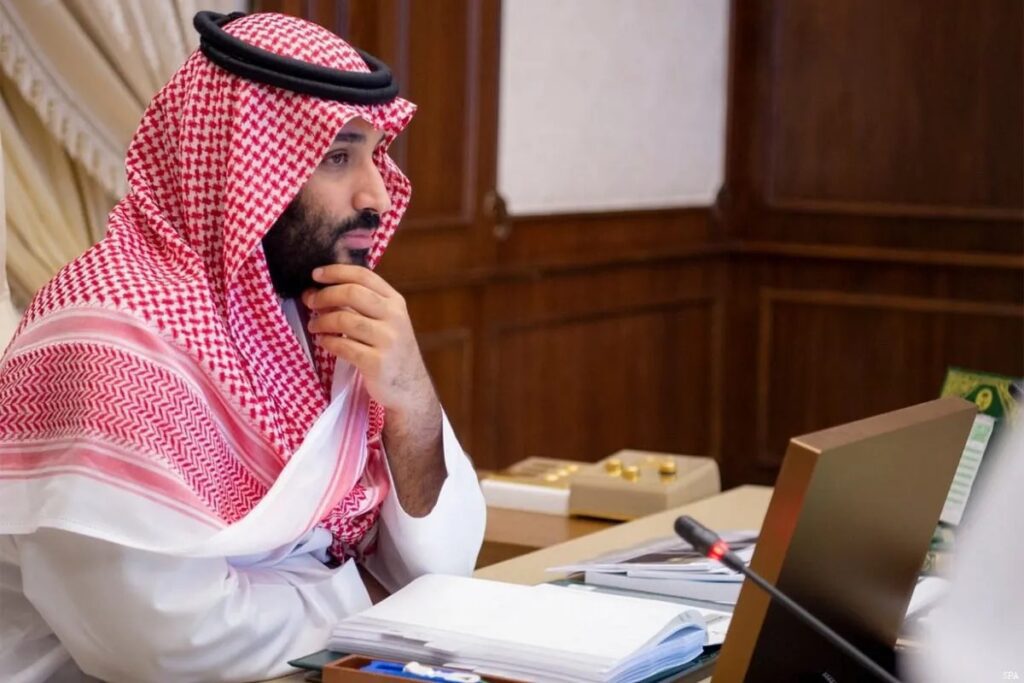
At the inaugural Future Investment Initiative conference in Riyadh in October 2017, bin Salman announced plans for the creation of Neom, a $500 billion economic zone to cover an area of 26,000 square kilometres on Saudi Arabia’s Red Sea coast, extending into Jordan and Egypt.Neom aims to attract investment in sectors including renewable energy, biotechnology (especially genetically modified agriculture), robotics and advanced manufacturing. The announcement followed plans to develop a 34,000 square kilometre area across a lagoon of 50 islands on Saudi Arabia’s Red Sea coastline into a luxury tourism destination with laws on a par with international standards. In a further effort to boost the tourism industry, in November 2017 it was announced that Saudi Arabia would start issuing tourist visas for foreigners, beginning in 2018.
Bin Salman’s biggest bet was his plan to restore Saudi dominance in global oil markets by driving the new competition into bankruptcy, by keeping the oil price low enough for a long enough period. Saudi Arabia persuaded OPEC to do the same. A few small players went bankrupt, but American frackers only shut down their less-profitable operations temporarily, and waited for oil prices to go up again. Saudi Arabia, which had been spending $100 billion a year to keep services and subsidies going, had to admit defeat in November 2016. It then cut production significantly and asked its OPEC partners to do the same.
In the last week of September 2018, bin Salman inaugurated the much-awaited $6.7bn high-speed railway line connecting Mecca and Medina, the two holiest cities of Islam. The Haramain Express is 450 km line travelling up to 300 km/h that can transport around 60 million passengers annually. The commercial operations of the railway began on 11 October 2018.
Bin Salman with Brazilian President Jair Bolsonaro at the 2019 G20 Osaka summit
In October 2018, bin Salman announced that the Public Investment Fund of Saudi Arabia’s assets were approaching $400 billion and would pass $600 billion by 2020.
A project to build Saudi Arabia’s first nuclear reactor was announced by bin Salman in November 2018. The kingdom aims to build 16 nuclear facilities over the next 20 years. Efforts to diversify the Saudi energy sector also include wind and solar, including a 1.8 gigawatt solar plant announced in the same month as part of a long-term project in partnership with SoftBank.
Saudi petroleum industry
Saudi Arabia, OPEC’s largest producer, has the second-largest amount of oil reserves in the world. On 28 September 2021, U.S. President Joe Biden’s national security adviser, Jake Sullivan, met with bin Salman in Saudi Arabia to discuss the high oil prices. The record-high energy prices were driven by a global surge in demand as the world quit the economic recession caused by COVID-19, particularly due to strong energy demand in Asia.
The relations between Russia and Saudi Arabia evolved under Mohammed bin Salman, granting the two nations the ability to conspire in oil export decisions.
Interventions in Syria and Yemen
Some have called bin Salman the architect of the war in Yemen.On 10 January 2016, The Independent reported that “the BND, the German intelligence agency, portrayed…Saudi defence minister and Deputy Crown Prince Mohammed bin Salman…as a political gambler who is destabilising the Arab world through proxy wars in Yemen and Syria.” German officials reacted to the BND’s memo, saying the published statement “is not the position of the federal government”.
Protest in London against bin Salman’s state visit to the UK, 7 March 2018
Bin Salman leads the Saudi-led intervention in Yemen against the Houthi rebels, who in 2015 seized Sana’a and ousted the Saudi-backed Hadi government, ending multilateral efforts towards a political settlement following the 2011 Yemeni uprising. Coalition airstrikes during the intervention have resulted in thousands of civilians killed or injured, prompting accusations of war crimes in the intervention. Following a Houthi missile attack against Riyadh in December 2017, which was intercepted by Saudi air defence, airstrikes killed 136 Yemeni civilians and injured 87 others in eleven days. In August 2018, the United Nations reported that all parties in the conflict were responsible for human rights violations and for actions which could be considered war crimes.
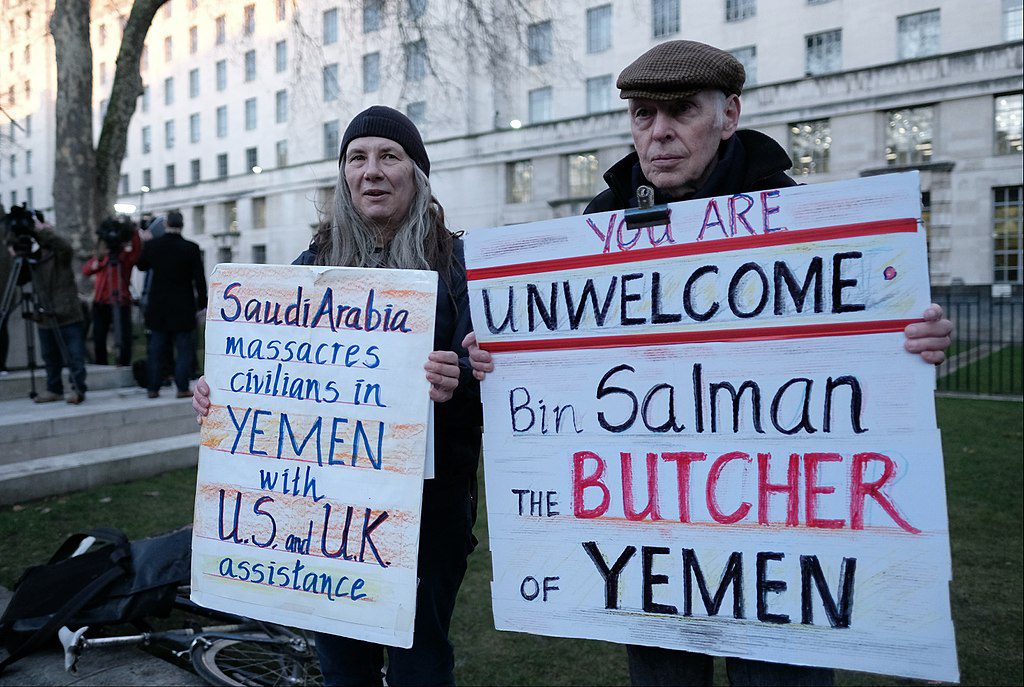
The war and blockade of Yemen has cost Saudi Arabia tens of billions of dollars, further aggravated the humanitarian crisis in the country and destroyed much of Yemen’s infrastructure, but failed to dislodge the Shiite Houthi rebels and their allies from the Yemeni capital.More than 50,000 children in Yemen died from starvation in 2017. From 2015 to May 2019 the number of total deaths of children is said to be approximately 85,000. The famine in Yemen is the direct result of the Saudi-led intervention and blockade of the rebel-held area. In October 2018, Lise Grande, the United Nations Humanitarian Coordinator for Yemen, warned that 12 to 13 million Yemenis were at risk of starvation if the war continued for another three months. On 28 March 2018, Saudi Arabia, along with its coalition partner the UAE, donated US$930 million to the United Nations which, according to UN Secretary-General António Guterres, “…(will) help to alleviate the suffering of millions of vulnerable people across Yemen”. The funds cover almost one-third of the $2.96 billion required to implement the UN’s 2018 Yemen Humanitarian Response Plan. Following the Houthi missile attack against Riyadh in December 2017, which was intercepted by Saudi air defence,bin Salman retaliated with a ten-day barrage of indiscriminate airstrikes against civilian areas in Yemen held by Houthi forces, killing dozens of children.
In August 2018, a report by The Intercept cited unnamed sources claiming that former US Secretary of State Rex Tillerson had in June 2017 intervened to stop a Saudi-Emirati plan to invade Qatar, resulting in increased pressure from Saudi Arabia and the UAE for his removal from office.
U.S. Defense Secretary James Mattis with bin Salman, 22 March 2018
Following the assassination of Jamal Khashoggi, the United States Senate Committee on Foreign Relations approved a resolution to impose sanctions on people blocking humanitarian access in Yemen and suspend arms sales to Saudi Arabia. Senator Lindsey Graham said America’s relationship with Saudi Arabia “is more of a burden than an asset.” He also said, “The crown prince [of Saudi Arabia] is so toxic, so tainted, so flawed.”
Andrew Smith, of Campaign Against Arms Trade (CAAT), said that Jeremy Hunt and Boris Johnson “have played an utterly central and complicit role in arming and supporting the Saudi-led destruction of Yemen.” Hunt’s Conservative leadership campaign was partly funded by a close associate to bin Salman.
On 16 August 2020, a lawsuit filed by a former top intelligence official, Saad Aljabri, revealed that in 2015 bin Salman secretly called for Russia to intervene in Syria at a time when Bashar al-Assad’s regime was close to falling apart. The Saudi monarchy had been supporting anti-Assad rebels, while Russians were bombing rebel-held cities in support of Assad, killing tens of thousands of Syrian civilians in the process. Western diplomats say that bin Salman was strongly influenced by his Emirati counterpart, the former crown prince of Abu Dhabi Sheikh Mohammed bin Zayed. The UAE was pushing for the idea of helping Russia stabilise Syria and enabling the Assad regime in the country. In 2017 it was reported that Saudi Arabia provided weapons to Syrian opposition groups, fighting against Bashar al-Assad’s regime. Conflict Armament Research (CAR) reported that these weapons frequently ended up in the hands of the Islamic State members. In 2018, bin Salman reportedly wanted the US military presence to maintain in Syria, despite President Donald Trump’s declaring the withdrawal of American forces from the war-torn country.
